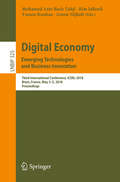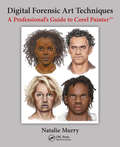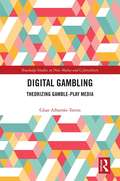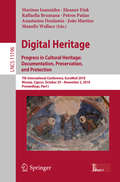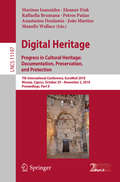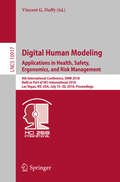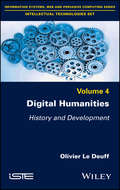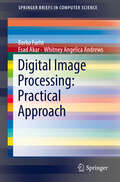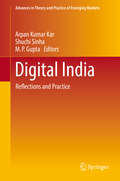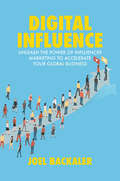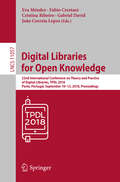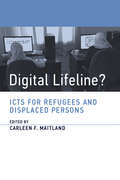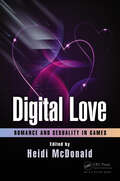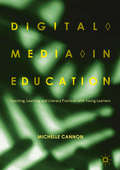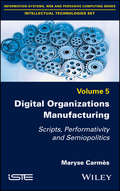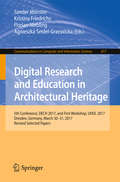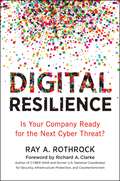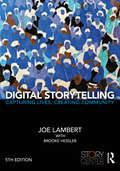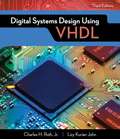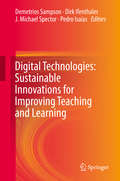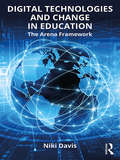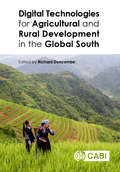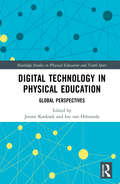- Table View
- List View
Digital Economy. Emerging Technologies and Business Innovation: Third International Conference, ICDEc 2018, Brest, France, May 3-5, 2018, Proceedings (Lecture Notes in Business Information Processing #325)
by Mohamed Anis Bach Tobji Rim Jallouli Yamen Koubaa Anton NijholtThis book constitutes the refereed proceedings of the Third International Conference on Digital Economy, ICDEc 2018, held in Brest, France in May 2018. The conference was founded in 2016 to discuss innovative research and projects related to the support role of Information System Technologies in the digital transformation process, business innovation and e-commerce. The 15 papers presented in this volume were carefully reviewed and selected from 41 submissions. The theme of ICDEc 2018 was “Digital Economy: Emerging Technologies and Business Innovation”. The papers were organized in topical sections named: digital marketing; e-banking and competitive intelligence; information system technologies; and e-learning, e-government and e-health.
Digital Forensic Art Techniques: A Professional’s Guide to Corel Painter
by Natalie MurryDigital Forensic Art Techniques: A Professional’s Guide to Corel PainterTM illustrates hands-on techniques to digitally create forensic art for police and investigative purposes. Coverage focuses specifically on how to utilize the software to create realistic human likenesses, including composites of suspects and drawings of persons in unidentified remains cases. Drawing digitally is like using any tool in art: a pencil, a charcoal stick, a conte’ crayon. A stylus is just another tool to master. Digital work is easier for artists to send to the case detective, and the work always reproduces exactly as it was completed. Another benefit to working digitally is that one can use video conferencing with a witness online to provide services remotely world-wide. This enables police departments who have never had access to a forensic artist to have a sketch done within hours of the crime. Chapters address the more basic functions to serve as a primer for those transitioning to working digitally. There is also instruction on light and shadow, and bones and muscles of the skull. All of the discussion is intended to make the reader see things as an artist to improve drawing skills and overall digital techniques. In short, Digital Forensic Art Techniques is a practical, easy-to-follow manual for working forensic artists that will give readers a solid base from which to start. It serves as an essential resource to greater skill and comfort with the hardware and software, thus furthering current best practices and technological advances in the field.
Digital Gambling: Theorizing Gamble-Play Media (Routledge Studies in New Media and Cyberculture)
by César Albarrán-TorresThis book develops the concept of "gamble-play media", describing how some gambling and gambling-like practices are increasingly mediated by digital technologies. Digital gambling brings gambling closer to the practices and features of videogames, as audio-visual simulations structure users’ experiences. By studying digital gambling from media studies, videogame and cultural studies approaches, this book offers a new critical perspective on the issues raised by computer-mediated gambling, while expanding our perspective on what media and gambling are. In particular, it critically analyses terrestrial, mobile and online slot machines, online poker and stock trading apps through a selection of case studies.
Digital Heritage. Progress in Cultural Heritage: 6th International Conference, Euromed 2016, Nicosia, Cyprus, October 31 - November 5, 2016, Proceedings, Part I (Lecture Notes in Computer Science #10058)
by Manolis Wallace João Martins Anastasios Doulamis Petros Patias Raffaella Brumana Eleanor Fink Marinos IoannidesThis two-volume set LNCS 11196 and LNCS 11197 constitutes the refereed proceedings of the 7th International Conference on Digital Heritage, EuroMed 2018, held in Nicosia, Cyprus, in October/November 2018. The 21 full papers, 47 project papers, and 29 short papers presented were carefully reviewed and selected from 537 submissions. The papers are organized in topical sections on 3D Digitalization, Reconstruction, Modeling, and HBIM; Innovative Technologies in Digital Cultural Heritage; Digital Cultural Heritage –Smart Technologies; The New Era of Museums and Exhibitions; Digital Cultural Heritage Infrastructure; Non Destructive Techniques in Cultural Heritage Conservation; E-Humanities; Reconstructing the Past; Visualization, VR and AR Methods and Applications; Digital Applications for Materials Preservation in Cultural Heritage; and Digital Cultural Heritage Learning and Experiences.
Digital Heritage. Progress in Cultural Heritage: 6th International Conference, Euromed 2016, Nicosia, Cyprus, October 31 - November 5, 2016, Proceedings, Part I (Lecture Notes in Computer Science #10058)
by Manolis Wallace João Martins Anastasios Doulamis Petros Patias Raffaella Brumana Eleanor Fink Marinos IoannidesThis two-volume set LNCS 11196 and LNCS 11197 constitutes the refereed proceedings of the 7th International Conference on Digital Heritage, EuroMed 2018, held in Nicosia, Cyprus, in October/November 2018. The 21 full papers, 47 project papers, and 29 short papers presented were carefully reviewed and selected from 537 submissions. The papers are organized in topical sections on 3D Digitalization, Reconstruction, Modeling, and HBIM; Innovative Technologies in Digital Cultural Heritage; Digital Cultural Heritage –Smart Technologies; The New Era of Museums and Exhibitions; Digital Cultural Heritage Infrastructure; Non Destructive Techniques in Cultural Heritage Conservation; E-Humanities; Reconstructing the Past; Visualization, VR and AR Methods and Applications; Digital Applications for Materials Preservation in Cultural Heritage; and Digital Cultural Heritage Learning and Experiences.
Digital Human Modeling. Applications in Health, Safety, Ergonomics, and Risk Management: 9th International Conference, DHM 2018, Held as Part of HCI International 2018, Las Vegas, NV, USA, July 15-20, 2018, Proceedings (Lecture Notes in Computer Science #10917)
by Vincent G. DuffyThis book constitutes the refereed proceedings of the 9th International Conference on Digital Human Modeling and Applications in Health, Safety, Ergonomics, and Risk Management, DHM 2018, held as part of HCI International 2018 in Las Vegas, NV, USA. HCII 2018 received a total of 4346 submissions, of which 1171 papers and 160 posters were accepted for publication after a careful reviewing process. The 53 papers presented in this volume were organized in topical sections as follows: Anthropometry, ergonomics and design; Motion modelling and rehabilitation; User diversity and well-being; Nursing and medical applications; Transportation human factors.
Digital Humanities: History and Development
by Olivier Le DeuffWhere do the digital humanities really come from? Are they really news? What are the theoretical and technical influences that participate in this scientific field that arouses interest and questions? This book tries to show and explain the main theories and methods that have allowed their current constitution. The aim of the book is to propose a new way to understand the history of digital humanities in a broader perspective than the classic history with the project of Robert Busa. The short digital humanities perspective neglects lots of actors and disciplines. The book tries to show the importance of other fields than humanities computing like scientometry, infometry, econometry, mathematical linguistics, geography and documentation.
Digital Image Processing: Practical Approach (SpringerBriefs in Computer Science)
by Whitney Angelica Andrews Esad Akar Borko FurhtThe SpringerBrief covers fundamentals of digital image processing including image concept, image file formats, creating user interfaces and many practical examples of processing images using C++ and Java. These practical examples include among other creating image histograms, performing lossless image compression, detecting change in colors, similarity-based image retrieval and others. All practical examples are accompanied with an explanation how to create programs and the obtained results. This SpringerBrief can be very useful for the undergraduate courses on image processing, providing students with the basic tools in image analysis and processing. Practitioners and researchers working in this field will also find this research useful.
Digital India: Reflections and Practice (Advances in Theory and Practice of Emerging Markets #10595)
by Arpan Kumar Kar Shuchi Sinha M. P. GuptaThis book offers a multidisciplinary resource on digital government, while specifically focusing on its role within the emerging market of India. The Government of India (GoI) is concentrating on transforming India under the Digital India initiative. In order to do so, it has emphasized three core areas: (1) Computing infrastructure as a utility to every citizen; (2) Governance and services on demand; and (3) Digital empowerment of citizens. The chapters in this book address issues surrounding these areas, highlighting concepts such as knowledge societies, urban operations and logistics, issues in managing emergent Information Communication Technologies (ICTs), and also smart analytics for urbanization. The chapters contribute to the theory, practice and policy for a “Digital India.” The book captures lessons, knowledge, experiences (about challenges, drivers, antecedents, etc.) and best practices emerging from implementation of various projects. While the book is dedicated to a “Digital India,” this book can also be valuable resource for public administrators, government officials and researchers in other emerging markets and developing countries in Asia, Africa and Latin America where similar socio-political and economic conditions exist.
Digital Influence: Unleash the Power of Influencer Marketing to Accelerate Your Global Business
by Peter Shankman Joel BackalerThis book brings order to the chaotic and rapidly evolving world of influencer marketing by providing readers with much needed context, frameworks, and best practices. Written for busy marketing professionals working in both domestic and international markets, it addresses these topics in a highly actionable and engaging manner. Digital Influence covers everything from how to identify the right influencers and determine “level of influence” to collaborating with influencers and measuring ROI. It turns out, it’s not all about paying online celebrities outrageous sums to post sponsored content. Backaler also provides much-needed context for why influencer marketing is flourishing today, and perspective into what a more technologically-enabled, globally-connected future will look like. Ultimately, people want to learn from trusted peers, not faceless companies. Better than any corporate marketing function, influencers understand how to make best use of social media platforms and tailor content for their respective cultures to engage consumers in their home markets. Business leaders should arm themselves with Backaler's book to ensure they're not left behind.
Digital Libraries for Open Knowledge: 22nd International Conference on Theory and Practice of Digital Libraries, TPDL 2018, Porto, Portugal, September 10–13, 2018, Proceedings (Lecture Notes in Computer Science #11057)
by Eva Méndez Fabio Crestani Cristina Ribeiro Gabriel David João Correia LopesThis book constitutes the proceedings of the 22nd International Conference on Theory and Practice of Digital Libraries, TPDL 2018, held in Porto, Portugal, in September 2018. The 51 full papers, 17 short papers, and 13 poster and tutorial papers presented in this volume were carefully reviewed and selected from 81 submissions. The general theme of TPDL 2018 was Digital Libraries for Open Knowledge. The papers present a wide range of the following topics: Metadata, Entity Disambiguation, Data Management, Scholarly Communication, Digital Humanities, User Interaction, Resources, Information Extraction, Information Retrieval, Recommendation.
Digital Lifeline?: ICTs for Refugees and Displaced Persons (Information Policy)
by Carleen F. MaitlandInterdisciplinary perspectives on the role of new information technologies, including mobile phones, wireless networks, and biometric identification, in the global refugee crisis.Today's global refugee crisis has mobilized humanitarian efforts to help those fleeing persecution and armed conflict at all stages of their journey. Aid organizations are increasingly employing new information technologies in their mission, taking advantage of proliferating mobile phones, remote sensors, wireless networks, and biometric identification systems. Digital Lifeline? examines the use of these technological innovations by the humanitarian community, exploring operations and systems that range from forecasting refugee flows to providing cellular and Internet connectivity to displaced persons. The contributors, from disciplines as diverse as international law and computer science, offer a variety of perspectives on forced migration, technical development, and user behavior, drawing on field work in countries including Jordan, Lebanon, Rwanda, Germany, Greece, the United States, and Canada. The chapters consider such topics as the use of information technology in refugee status determination; ethical and legal issues surrounding biometric technologies; information technology within organizational hierarchies; the use of technology by refugees; access issues in refugee camps; the scalability and sustainability of information technology innovations in humanitarian work; geographic information systems and spatial thinking; and the use of “big data” analytic techniques. Finally, the book identifies policy research directions, develops a unified research agenda, and offers practical suggestions for conducting displacement research.ContributorsElizabeth Belding, Karen E. Fisher, Daniel Iland, Lindsey N. Kingston, Carleen F. Maitland, Susan F. Martin, Galya Ben-Arieh Ruffer, Paul Schmitt, Lisa Singh, Brian Tomaszewski, Mariya Zheleva
The Digital Literary Sphere: Reading, Writing, and Selling Books in the Internet Era
by Simone MurrayHow has the Internet changed literary culture?2nd Place, N. Katherine Hayles Award for Criticism of Electronic Literature by The Electronic Literature OrganizationReports of the book’s death have been greatly exaggerated. Books are flourishing in the Internet era—widely discussed and reviewed in online readers’ forums and publicized through book trailers and author blog tours. But over the past twenty-five years, digital media platforms have undeniably transformed book culture. Since Amazon’s founding in 1994, the whole way in which books are created, marketed, publicized, sold, reviewed, showcased, consumed, and commented upon has changed dramatically. The digital literary sphere is no mere appendage to the world of print—it is where literary reputations are made, movements are born, and readers passionately engage with their favorite works and authors.In The Digital Literary Sphere, Simone Murray considers the contemporary book world from multiple viewpoints. By examining reader engagement with the online personas of Margaret Atwood, John Green, Gary Shteyngart, David Foster Wallace, Karl Ove Knausgaard, and even Jonathan Franzen, among others, Murray reveals the dynamic interrelationship of print and digital technologies. Drawing on approaches from literary studies, media and cultural studies, book history, cultural policy, and the digital humanities, this book asks: What is the significance of authors communicating directly to readers via social media? How does digital media reframe the "live" author-reader encounter? And does the growing army of reader-reviewers signal an overdue democratizing of literary culture or the atomizing of cultural authority? In exploring these questions, The Digital Literary Sphere takes stock of epochal changes in the book industry while probing books’ and digital media’s complex contemporary coexistence.
Digital Love: Romance and Sexuality in Games
by Heidi McDonaldScholars and professionals from all over the world, across experience levels and the gender and sexuality spectrum, share experiences and analysis of romance and sexuality in video games. Whether discussing casual sex in the Star Wars universe; analyzing various Otome games; examining "the gaze" in various games; player romance behavior in games; or exploring the ethical ramifications of sexuality in virtual reality and other emerging technologies, this book discusses what players want in video game romance, and how developers can best deliver it. Key Features: Examines the past, present, and future of romance in single-player, role-playing games Discusses common presentations of romance in single-player, role-playing games— both in the category and game mechanics that drive romance Discusses research on how players define a satisfying game romance and what specific steps narrative designers can take to design satisfying games Explains the notion of the empathic game and explores its importance in relation to romance in game design
Digital Media in Education: Teaching, Learning and Literacy Practices with Young Learners
by Michelle CannonThis book argues for dynamic and relevant school experiences for primary and early secondary learners that embed digital media production. It proposes a vision of literacy that combines new technologies with multiple modes of meaning-making. Drawing on theories related to cultural studies, media literacy, anthropology, and creativity, the author explores learning strategies with digital media based on an empowering, values-driven framework. The book advances innovative teaching methods, critiquing educational ‘reforms’ that marginalise media and fail to engage with the complex tensions and textures of modern pedagogy. Positioning film and media-making as vital practices in schools that nurture the skills, dispositions and competencies of modern literacy, the model foregrounds connections between human agency, cognition, and creative practice. This innovative book will appeal to students and scholars of creativity, digital media production, primary education and literacy.
Digital Organizations Manufacturing: Scripts, Performativity and Semiopolitics
by Maryse CarmèsIn what sort of assemblages, the strategies and digital policies in organization are made? Beyond digital mantras and management slogans/fictions, what is the concrete factory of information management system? What are the parts of the human and no human actors? Is it possible to create a new approach to understand how work change (or not), to explore the potential for a social and cognitive innovation way, considering simultaneously the increase of Data Management and the organizational analytics?
Digital Research and Education in Architectural Heritage: 5th Conference, Dech 2017, And First Workshop, Uhdl 2017, Dresden, Germany, March 30-31, 2017, Revised Selected Papers (Communications In Computer And Information Science #817)
by Sander Münster Kristina Friedrichs Florian Niebling Agnieszka Seidel-GrzesińskaThis book constitutes the refereed proceedings of the 5th Conference on Digital Encounters with Cultural Heritage, DECH 2017, and the First Workshop on Research and Education in Urban History in the Age of Digital Libraries, UHDL 2017, held in Dresden, Germany, in March 2017.The 11 revised full papers from DECH 2017 and two revised full papers from UHDL 2017 presented in this volume were carefully reviewed and selected from 33 joint submissions. The papers are organized in topical sections on research on architectural and urban cultural heritage; technical access; systematization; education in urban history; organizational perspectives.
Digital Resilience: Is Your Company Ready for the Next Cyber Threat?
by Ray RothrockDon’t let your company be the next grim headline . . . Cybercrime is on the rise — and businesses large and small are at risk. For management, the question is not if you will be targeted, but when. Are you prepared? Is your enterprise actively monitoring networks, taking steps to understand and contain attacks, enabling continued operation during an incident? Do you have a recovery plan ready? Few are prepared, explains cybersecurity expert Ray Rothrock, who lays bare tactics used by hackers, vulnerabilities lurking in networks, and strategies not just for surviving attacks, but thriving even while under assault. Fascinating and highly readable, Digital Resilience opens with the infamous 2013 Target attack, which compromised the credit card information of 40 million customers. In hindsight, the hack (like most today) was preventable. This book helps businesses: Understand the threats they face • Assess the resilience of their networks against attacks • Identify and address weaknesses • Respond to exploits swiftly and effectively Data theft. Downed servers. Malware. Even human error can trigger cyber events anytime from anywhere around the globe. This powerful guide provides the resilience-building strategies you need to prevail — no matter what strikes.
Digital Storytelling: Capturing Lives, Creating Community
by Joe Lambert Brooke HesslerIn this revised and updated edition of the StoryCenter's popular guide to digital storytelling, StoryCenter founder Joe Lambert offers budding storytellers the skills and tools they need to craft compelling digital stories. Using a "Seven Steps" approach, Lambert helps storytellers identify the fundamentals of dynamic digital storytelling – from conceiving a story, to seeing, assembling, and sharing it. Readers will also find new explorations of the global applications of digital storytelling in education and other fields, as well as additional information about copyright, ethics, and distribution. The book is filled with resources about past and present projects on the grassroots and institutional level, including new chapters specifically for students and a discussion of the latest tools and projects in mobile device-based media. This accessible guide’s meaningful examples and inviting tone makes this an essential for any student learning the steps toward digital storytelling.
Digital Systems Design Using VHDL (Activate Learning With These New Titles From Engineering! Ser.)
by Charles Roth Lizy JohnLearn how to effectively use the industry-standard hardware description language, VHDL, as DIGITAL SYSTEMS DESIGN USING VHDL, 3E integrates VHDL into the digital design process. The book begins with a valuable review of basic logic design concepts before introducing the fundamentals of VHDL. The book concludes with detailed coverage of advanced VHDL topics.
Digital Technologies: Sustainable Innovations for Improving Teaching and Learning
by Demetrios Sampson Dirk Ifenthaler J. Michael Spector Pedro IsaíasThe aim of this volume entitled Digital Technologies: Sustainable Innovations for improving Teaching and Learning is to contribute in the global discussion on digital technologies as the means to foster sustainable educational innovations for improving the teaching, learning and assessment from K-12 to Higher Education. It compiles papers presented at the CELDA (Cognition and Exploratory Learning in the Digital Age) conference, which has as its goal continuing to address these challenges and promote the effective use of new tools and technologies to support teaching, learning and assessment. The book consists of four parts and showcases how emerging educational technologies and innovative practices have been used to address core global educational challenges; spanning from rethinking and transforming learning environments across educational contexts to effectively cultivating students’ competences for the digital smart society of the future. The book comprises Part I: Transforming the Learning Environment; Part II: Enriching student learning experiences; Part III: Measuring and Assessing Teaching and Learning with Educational Data Analytics; Part IV: Cultivating student competences for the digital Smart society. It targets researchers and research students, educational professional practitioners (including teachers, educators and education leaders) as well as education policy makers, who are interested in keeping up-to-date on the global development in this field.
Digital Technologies and Change in Education: The Arena Framework
by Niki DavisDigital Technologies and Change in Education provides professionals and other leaders with a road map of the processes of change for teachers, schools, universities, and educational systems, including extensive case studies and evidence that clarify the benefits and challenges of digital technologies in education. To this end, Niki Davis offers a theoretical framework—the Arena—as a tool for exploration and analysis of our own experiences of teaching, leadership, and research. With a blend of local, regional, and global examples from all sectors of education, this book allows readers to move past the potentially misleading glitter of new technologies and into the co-evolving ecologies that make up education and training locally and globally.
Digital Technologies for Agricultural and Rural Development in the Global South
by Richard DuncombeThis book shares research and practice on current trends in digital technology for agricultural and rural development in the Global South. Growth of research in this field has been slower than the pace of change for practitioners, particularly in bringing socio-technical views of information technology and agricultural development perspectives together. The contents are therefore structured around three main themes: sharing information and knowledge for agricultural development, information and knowledge intermediaries, and facilitating change in agricultural systems and settings. The book includes: -Views from diverse academic disciplines as well as practitioners with experience of implementing mobile applications and agriculture information systems in differing country contexts. -Case studies from a range of developing countries and information from across the public and private sector. -A set of practitioner guidelines for successful implementation of digital technologies. With contributions reaching beyond just a technological perspective, the book also provides a consideration of social and cultural factors and new forms of organization and institutional change in agricultural and rural settings. An invaluable read for researchers in international development, socio-economics and agriculture, it forms a useful resource for practitioners working in the area.
Digital Technologies for Agricultural and Rural Development in the Global South
by Stefano Bocchi Fritz Brugger Amanda Caine Amit Chakravarty Chris Clarke Graham Clarkson Andrew Dearden Peter Dorward Richard Duncombe Gordon Gow Charlotte Jordan Linus Kendall Stan Karanasios Sumanth Kumar Luis Emilio Lastra-Gil Alberto Lubatti Mukund Patil Andrea Porro Simone Sala Worlali Senyo Mira Slavova Luka WanjohiThis book shares research and practice on current trends in digital technology for agricultural and rural development in the Global South. Growth of research in this field has been slower than the pace of change for practitioners, particularly in bringing socio-technical views of information technology and agricultural development perspectives together. The contents are therefore structured around three main themes: sharing information and knowledge for agricultural development, information and knowledge intermediaries, and facilitating change in agricultural systems and settings. The book includes: -Views from diverse academic disciplines as well as practitioners with experience of implementing mobile applications and agriculture information systems in differing country contexts. -Case studies from a range of developing countries and information from across the public and private sector. -A set of practitioner guidelines for successful implementation of digital technologies. With contributions reaching beyond just a technological perspective, the book also provides a consideration of social and cultural factors and new forms of organization and institutional change in agricultural and rural settings. An invaluable read for researchers in international development, socio-economics and agriculture, it forms a useful resource for practitioners working in the area.
Digital Technology in Physical Education: Global Perspectives (Routledge Studies in Physical Education and Youth Sport)
by Jeroen Koekoek Ivo Van HilvoordeThe rapid development of digital technologies has opened up new possibilities for how Physical Education is taught. This book offers a comprehensive, practice-oriented and critical exploration of the actual and potential applications of digital technologies in PE. It considers the opportunities that are offered by new technologies and how they may be best implemented to enhance the learning process. Including contributions from the US, UK, Europe, Canada and New Zealand, this international collection reflects on how digital innovations are shaping PE pedagogy in theory and practice across the globe. Its chapters identify core pedagogical principles – rather than simply discussing passing digital fads – and offer practical narratives, case studies and reflections on how PE practitioners can introduce technology into teaching and learning through the use of social media, video gaming, virtual reality simulation, iPads and Wiki platforms. Digital Technology in Physical Education: Global Perspectives is a valuable resource for students, researchers and practitioners of PE looking to integrate digital technology into their work in a way that does justice to the complexity of teaching and learning.
